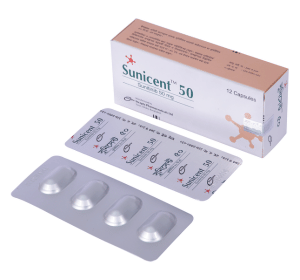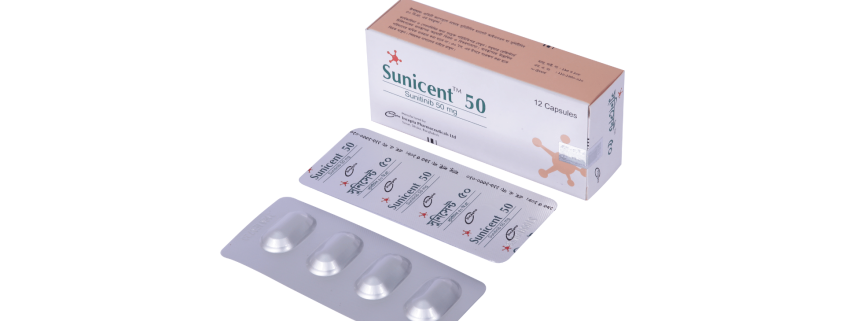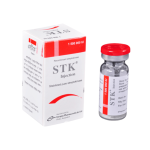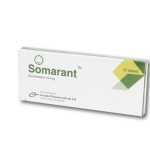Sunicent(Sunitinib)

Therapeutic Group: Anti Cancer
Presentation
Sunicent 50: Each capsule contains Sunitinib Malate INN eq. to Sunitinib 50 mg.
Description
Sunitinib is a multi-targeted receptor tyrosine kinase (RTK) inhibitor. These include all receptors for platelet-derived growth factor (PDGF-Rs) and vascular endothelial growth factor receptors (VEGFRs), which play a role in both tumor angiogenesis and tumor cell proliferation. The simultaneous inhibition of these targets reduces tumor vascularization and triggers cancer cell apoptosis and thus results in tumor shrinkage. Sunitinib also inhibits CD117 (c-KIT), the receptor tyrosine kinase that drives the majority of gastrointestinal stromal cell tumors. It is recommended as a second-line therapy for patients whose tumors develop mutations in c-KIT that make them resistant to Imatinib. Sunitinib is indicated for the treatment of renal cell carcinoma (RCC) and Imatinib-resistant gastrointestinal stromal tumor (GIST). GIST does not generally respond to standard chemotherapy or radiation and before Sunitinib, Imatinib resistant patients had no further treatment options.
Indications
Sunitinib is a kinase inhibitor that is indicated:
For the treatment of gastrointestinal stromal tumor (GIST) after disease progression on or intolerance to imatinib mesylate.
For the treatment of advanced renal cell carcinoma (RCC).
For the adjuvant treatment of adult patients at high risk of recurrent RCC following nephrectomy.
For the treatment of progressive, well-differentiated pancreatic neuroendocrine tumors (pNET) in patients with unresectable locally advanced or metastatic disease.
Dosage & Administration
GIST and Advanced RCC: 50 mg orally once daily, with or without food, 4 weeks on treatment followed by 2 weeks off.
Adjuvant RCC: 50 mg orally once daily, with or without food, 4 weeks on treatment followed by 2 weeks off for nine 6-week cycles.
Dose Modification: Dose interruptions and/or dose adjustments of 12.5 mg recommended based on individual safety and tolerability
Side Effects
The most common adverse reactions (≥25%) of Sunitinib are fatigue/asthenia, diarrhea, mucositis/stomatitis, nausea, decreased appetite/anorexia, vomiting, abdominal pain, hand -foot syndrome, hypertension, bleeding events, dysgeusia/altered taste, dyspepsia, and thrombocytopenia.
Precautions
Hepatotoxicity, including fatal liver failure, has been observed. Monitor liver function tests before
initiation of treatment, during each cycle of treatment, and as clinically indicated. Interrupt SUNICENT for Grade 3 or 4 drug-related hepatic adverse reactions and discontinue if there is no resolution. Do not restart SUNICENT if patients experience severe changes in liver function tests or have signs and symptoms of liver failure.
Cardiovascular events including myocardial ischemia, myocardial infarction, left ventricular ejection fraction declines to below the lower limit of normal and cardiac failure including death have occurred. Monitor patients for signs and symptoms of congestive heart failure. Discontinue SUNICENT for clinical manifestations of congestive heart failure.
• Prolonged QT intervals and Torsade de Pointes have been observed. Monitor patients at higher risk for developing QT interval prolongation. Consider monitoring of electrocardiograms and electrolytes.
• Hypertension may occur. Monitor blood pressure and treat as needed.
• Hemorrhagic events, including tumor-related hemorrhage, and viscous perforation (both with fatal events) have occurred. Perform serial complete blood counts and physical examinations.
• Cases of Tumor Lysis Syndrome (TLS) (some fatal) have been reported primarily in patients with RCC and GIST with high tumor burden. Monitor these patients closely and treat as clinically indicated.
• Thrombotic microangiopathy (TMA), including thrombotic thrombocytopenic purpura and hemolytic uremic syndrome, sometimes leading to renal failure or a fatal outcome, has been reported. Discontinue SUNICENT in patients developing TMA.
• Proteinuria, including renal failure or a fatal outcome, has occurred. Monitor urine protein. Interrupt treatment for 24-hour urine protein ≥3 grams. Discontinue for repeat episodes of protein ≥3 grams despite dose reductions or nephrotic syndrome.
• Necrotizing fasciitis, erythema multiforme, Stevens-Johnson syndrome (SJS), and toxic epidermal necrolysis (TEN) (some fatal) have occurred. Discontinue SUNICENT if these events occur.
• Thyroid dysfunction may occur. Patients with signs and/or symptoms suggestive of hypothyroidism or hyperthyroidism should have laboratory monitoring of thyroid function performed and be treated as per standard medical practice.
• Hypoglycemia may occur. Check blood glucose levels regularly and assess if antidiabetic drug dose modifications are required.
• Osteonecrosis of the jaw has been reported. Consider preventive dentistry prior to treatment with SUNICENT. If possible, avoid invasive dental procedures, particularly in patients receiving intravenous bisphosphonate therapy.
• Wound Healing: Impaired wound healing has occurred with SUNICENT. Temporary interruption of therapy with SUNICENT is recommended in patients undergoing major surgical procedures.
• Embryo-Fetal Toxicity: Can cause fetal harm. Advise patients of potential risk to a fetus and to use effective contraception.
Use in Pregnancy & Lactation
Based on animal reproduction studies and its mechanism of action, SUNICENT can cause fetal harm when administered to a pregnant woman. There are no available data in pregnant women to inform a drug-associated risk. In animal developmental and reproductive toxicology studies, oral administration of sunitinib to pregnant rats and rabbits throughout organogenesis resulted in teratogenicity (embryolethality, craniofacial and skeletal malformations) at 5.5 and 0.3 times the AUC in patients administered the recommended daily doses (RDD), respectively. Advise pregnant women or females of reproductive potential of the potential hazard to a fetus.The background risk of major birth defects and miscarriage for the indicated populations are unknown. However, the estimated background risk in the United States (U.S.) general population of major birth defects is 2%–4% and of miscarriage is 15%–20% of clinically recognized pregnancies. There is no information regarding the presence of sunitinib and its metabolites in human milk. Sunitinib and its metabolites were excreted in rat milk at concentrations up to 12-fold higher than in plasma. Because of the potential for serious adverse reactions in breastfed infants from SUNICENT, advise a lactating woman not to breastfeed during treatment with SUNICENT and for at least 4 weeks after the last dose.
Drug Interaction
CYP3A4 Inhibitors: Consider dose reduction of SUNICENT when administered with strong CYP3A4 inhibitors.
CYP3A4 Inducers: Consider dose increase of SUNICENT when administered with CYP3A4 inducers.
Storage
Do not store above 30C. Keep out of the reach of children.
Commercial Pack
Sunicent 50: Each box contains 3 blister strips of 4 capsules.



